Douglas Lim - from teenage singer-songwriter to cutting edge king of parody
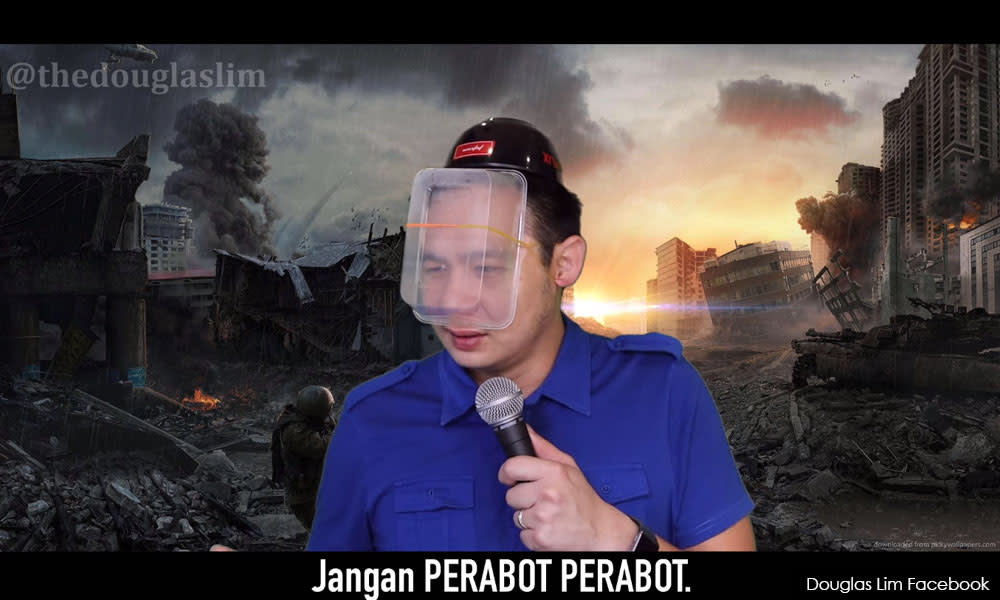
MALAYSIANSKINI | Unless you’ve been living under a rock with no internet access, chances are you will have recently been entertained by a parody video starring the irrepressible Douglas Lim.
He’s turning 44 this year, but the actor/comedian who got his first big break on the late 1990s sitcom Kopitiam has won over a whole new generation of fans thanks to his witty takes on topics of the day.
His hilarious spoof of the unfortunate press conference that cost Prasarana chairperson Tajuddin Abdul Rahman his job became instantly iconic with his mock face mask and imitations of Tajuddin’s mannerisms, speech and even his laughter.
His Kisah CucukMyAz spoof of the vaccination process have rib-tickling digs at the waiting process and having to reaffirm one is not a robot while others such as Lockdown: Sequel and the Essential Services Hotline have made Lim the hottest and most topical Malaysian comedian in cyberspace.
However - as he told us in his own words - it has been a long strange trip to the top:
I’ve always been doing comedy, although mostly it was standup. In standup what happens is you do observational comedy, which is one of the most common types of standup. You would hear a lot of times ordinary people making these mistakes and others picking up on it, so what happens in the parody videos, it’s the same sort of points but in a different context.
U-turns, flip-flops. Can you imagine if McDonalds did the same thing as the current government?
So in standup, you’re basically just shining a light on how absurd it is that we are accepting this reality but no way would it be accepted in other fields.
What’s different is that I am doing it in video form now. People are calling it parody or satire but really it’s just because there was no more avenue for me to do standup due to Covid-19 and the movement control order (MCO) that I turned to this.
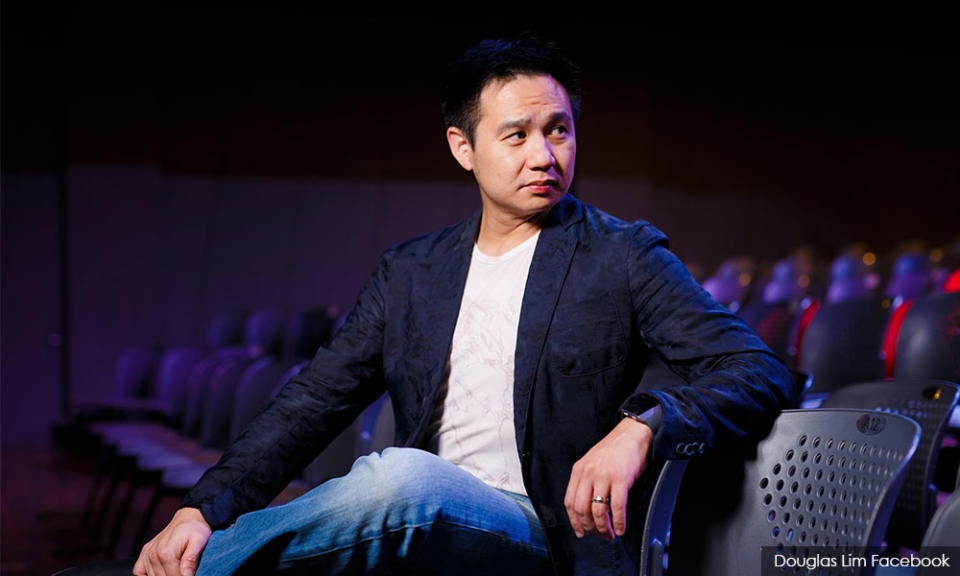
While political humour is part of our culture, if you think back to Lat - we have seen people like Fahmi Reza and Zunar repeatedly hauled up. But I have generally been quite non-committal as to what I’m saying. I’m not an activist like they are. They will tell you upfront that they want to activate change, get people thinking.
On the other hand, I think I preach to the choir. No one is going to be a hardcore government fan, watch my video and say, you know what he has a point, let’s vote for the communist party instead.
I’m entertainment, and yes comedy will always have a victim and in this case, the topic is political.
For me, they would need to prove that that’s what I meant. Because my videos are mostly not direct, if you don’t know the context of Malaysian news, people would have no idea what I was talking about.
But it’s interesting because I think laughter, in general, is not encouraged in our society. In fact, that is slowly becoming a problem that comedy has a victim, with the newer more sensitive generation.
In Malaysia we are in this weird space where we have these old fogeys who are authoritarian and it's hard to have them understand how they should be reacting because they used to be in complete control and now with alternative media and social media, they become memes and they have no idea how to handle it, so they occasionally try to crackdown on Fahmi, Zunar, the bawangmana Twitter account.
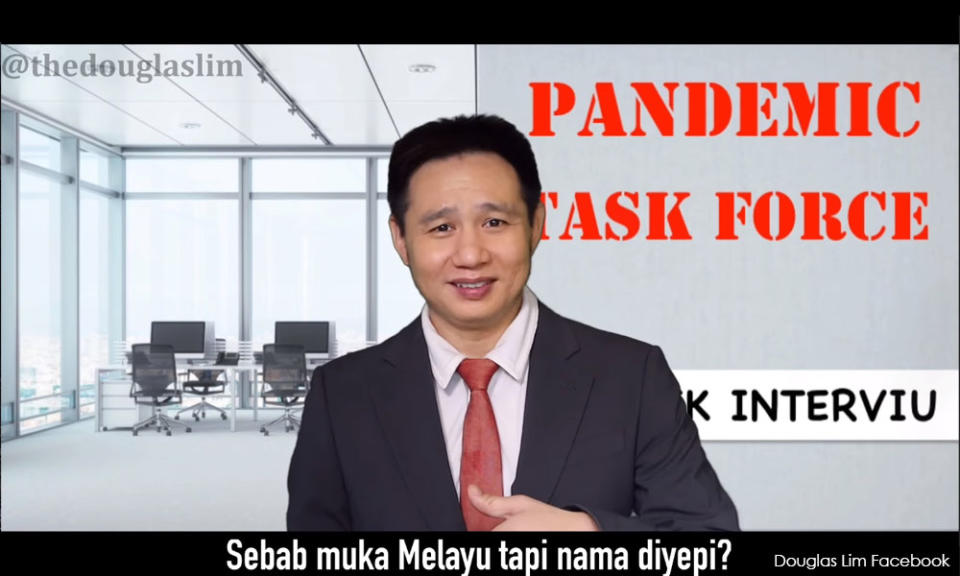
At the same time if you look at the Kisah Cucuk myAZ video there is an LGBT stereotype. I think nowadays there are the victim champions, social justice warriors with the view that there are many things you can’t joke about.
I had this conversation with Harith Iskandar before the MCO started. Comedians by default will joke about anything - it’s in our head. We are more aware and so our skill set is not so much knowing what jokes to tell but also knowing when not to tell them also.
We have become more sensitive, that’s why making a joke during a tragedy about trains kissing each other – really not the best idea.
You asked why I put a carton in front of my face, – well that’s what his mask looked like - I don’t think it’s a big leap. What social media has done is to give ordinary Malaysians the chance to express their humour, and it’s brought out a lot of funny things. Remember the sinkhole in Bukit Bintang in 2014, there were so many memes (Ultraman, la, bomoh with coconuts, Luis Suarez biting la.)
Of course, as professional comedians, you need to have more and actually video popularity is up and down. For you to have something with guaranteed staying power is very hard. Last year I had Duit Talak Gay which on various platforms crossed 4 million views, but I made no money from it cos I wasn’t aware of the rule.
Then I had Cuti Cuti Rumah Je because of the lockdown, I mocked up parts of my house to look like tourist destinations. And another one called Double Standard Tape. Earlier my photographer video did well, the one where I am taking a picture of the Pakatan Harapan Cabinet. That’s a much cleverer video in my opinion, actually.
But this latest video is shooting up much faster. I think the opening visual which is something I usually suck at, worked out well. And the number of people who subscribed and shared is going up.
The thing about these videos - it’s only funny if you know what’s going on. That is the double-edged sword of doing reference-based comedy. If no one knows what you are talking about, then it falls flat. So this is not standalone universal humour – that happens more rarely.
Another funny thing is I think I’m a rubbish impersonator. Actor Gavin Yapis a voice guy, and he said Douglas Lim has just one voice – Douglas Lim. For the Tajuddin one, I just watched the video of his press conference for about half an hour, to get his cadence, his tone and phrasing. There are a lot of parts that are inaccurate but I just picked up on a few things. So the laugh was one. The “you kena faham” phrase.
In general, I was channelling Anglo-Malay men of my father’s generation. My father was in the airforce and I drew on certain types of accents. Compared to younger Malays they have a different accent.
I’m doing everything on my own. I write, I shoot, I edit, I do my script, I do my sound. I shoot on a camera. I write and perform. And yes the other off-camera voices are also me.
So that takes an hour. Then I download footage, record audio separately cos the camera audio sucks.
Then I gotta sync the audio. Then I bounce it out to LogicPro. Then add music, sound effects and edit. I take the final mix, master and bounce it into movies and resync the audio. Then go into another software for subtitles and graphics. This can take two hours. Then I bounce it out for Facebook and YouTube, I also have to do for Instagram, different orientation. Cut a different version for Twitter which is shorter.
It’s quite a process.
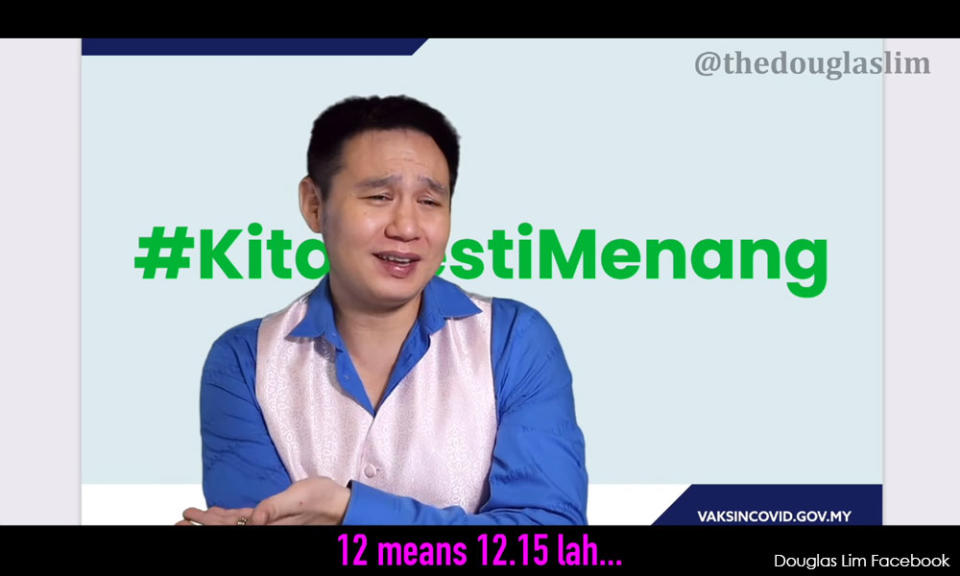
I didn’t think I would witness that much change in medium in my life time. I thought I pretty much was in a sweet spot where I think I can maintain what I do for a long time. Until I die. But that’s not the case.
Things are changing. Newsprint media is basically done. The music-buying public is gone. Even the CD went obsolete, became MP3 – so no one does albums anymore. That’s how much it has changed. It’s so weird.
I was actually into music before I went into comedy. I was an aspiring singer-songwriter as a teenager. Although I stopped pursuing it professionally a long time ago. Once in a while, I will do something if people ask me to write something.
I can feel it happening in my industry as a comedian, but musicians who spent all their time pouring their skills and passion into a piece of music and for that piece of music to eventually just be the background in someone else’s Tik Tok video, that’s too much for me.
That’s the measure of your success!
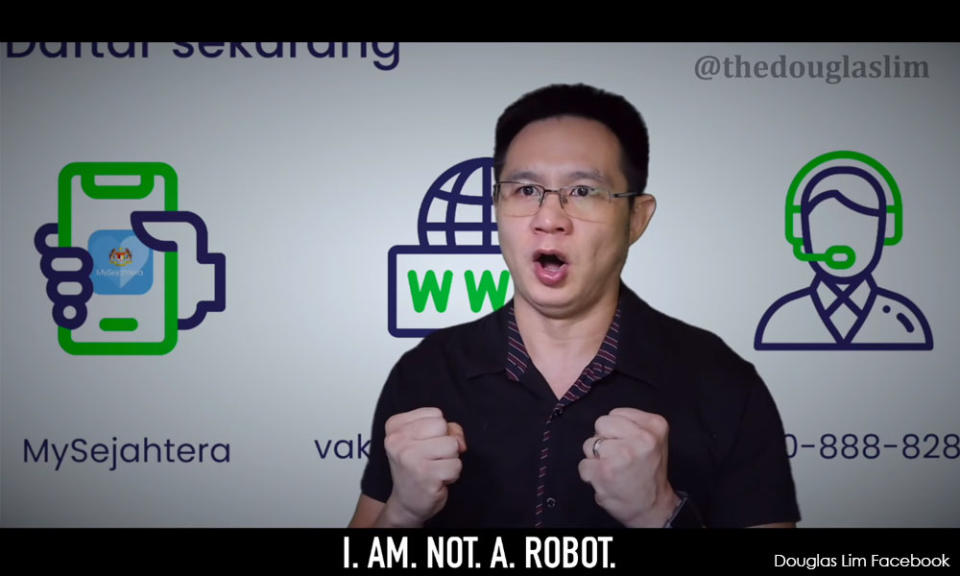
In 1999/2000 I went to the UK to study, but before that, I thought I was a singer/songwriter. Doing moody stuff like Alanis Morissette type songs with an introspective vibe. I cut an album with Chelsia Ng as a group called Indecisive. She was 14 and I was 19. It did horribly.
Aside from getting the theme song from Kopitiam (Empty Decorations), it was a very compromised product and I still remember that The Star gave it a very bad review. Which it kinda deserved.
I’m still in touch with some of the Kopitiam gang. Meet Rashid Salleh often, work with Joanna Bessey. Recently we did a reunion, which was nice.
When I was an aspiring musician I did this competition called Pepsi Young Discover, I think. There were three categories, solo, group and instrumental. I was in solo, doing my own songs, thinking I should be getting extra points for doing my own songs, while everyone else was doing covers.
And then there’s this guy called Man Left Right, really talented I think he was a farmer of a fisherman but a genius with the guitar. He plays two Fenders, fingerboards two Fenders at the same time. And he was wonderful. And Dead Mushroom and Euphonious were in the group. I remember the judges were Freddie Fernandez and Tony Ferdandes, before Air Asia he was at Warner Music then.
I think I did pretty well. The winner for the group was announced as Dead Mushroom. Best instrumental, I was thinking Man Left Right is going to win it easily. Suddenly a saxophone player wins it. In the solo category which is the highlight, they name the runner-up as Douglas Lim, and Man Left Right won.
His category was changed! And that was my first clear experience of how things can happen in the music industry. I remember I went on stage, and I was stunned like what has just happened, and one of the judges looked at me and said ‘sorry sometimes these things happen’.
That was how I learned that in Malaysia we all have our position and regardless of whether it’s fair or unfair, that is your position and play it to the best of your ability.
In Malaysia actually to succeed you just need to be mediocre. Do the standard, and you can succeed. Sometimes the decision-makers think - if they are clever they won’t be loyal.
So this is how the mediocre can thrive.
But because I got second place in this Pepsi competition I was asked to perform at the AIM awards. And Harith Iskander was the host and doing standup and I was blown away. At that time there was some crime wave and kidnappings in Johor and Harith pointed to an empty table and said “from Johor is it?” and I thought it was really funny. I watched that and suddenly thought that’s what I might want to do.
Then I started doing humourous MC work, not the formal one. Then went on to do standup.

In terms of comedic style – what really got me excited Eddie Murphy’s Delirious video. I had it on VHS. I remember thinking this was really good. Steve Martin was whacky, but I never quite vibed with Robin Williams, who was too manic. I watched whatever I could because back then we had so little.
Later when Chris Rock came on the scene I was like, wow this has gone to a different level already. He would make macro statements that were so polarizing, and then would show you what he meant. Louis CK also. And then Dave Chapelle shows up and shows us what genius is.
I also watched the Original Kings of Comedy with Steve Harvey, DL Hughley, Cedric the Entertainer, and Bernie Mac. Then I also watched Blue Collar Comedy Tour, a comedy troupe that included Bill Engvall, Ron White, Jeff Foxworthy and Larry the Cable Guy.
Michael McIntyre is one of my favourites, I still watch him. He’s very relatable. He can talk about a spice rack or how people walk and still make it universally funny.
These people are not normal. There’s no way that they can be normal. Something is happening at a level that most of us cannot dream of achieving.
However, I do think that ability is no longer as premium as it used to be because art has now been watered down to a distraction. People used to put a lot of time and effort into it and what you were supposed to do as the audience was to sit down and give me two hours of your time. Enjoy this as an event.
Now, this barely happens anymore. Art is reduced to three minutes on a handphone, which you watch because you are tired of the spreadsheet in front of you. Or you are in the toilet or waiting for your lunch. It’s about bitesize, it is about convenience. And the realisation for the artist or creator is that that’s where you put him.
It used to be that you had to be good at what you do. Then you get picked up by a talent scout and your skills are polished. You get trained. You go on television, and then the public accepts it. Now anyone with a handphone is broadcasting live. Are there moments of genius? Of course – millions are doing it, so you are bound to get something that is very funny and engaging.
In the beginning, it was hard for me to accept this reality. You want to watch me, you make the time, you pay for the ticket, give me the half-hour, sit down and watch me, Give me the respect and the attention.
But not anymore, man.
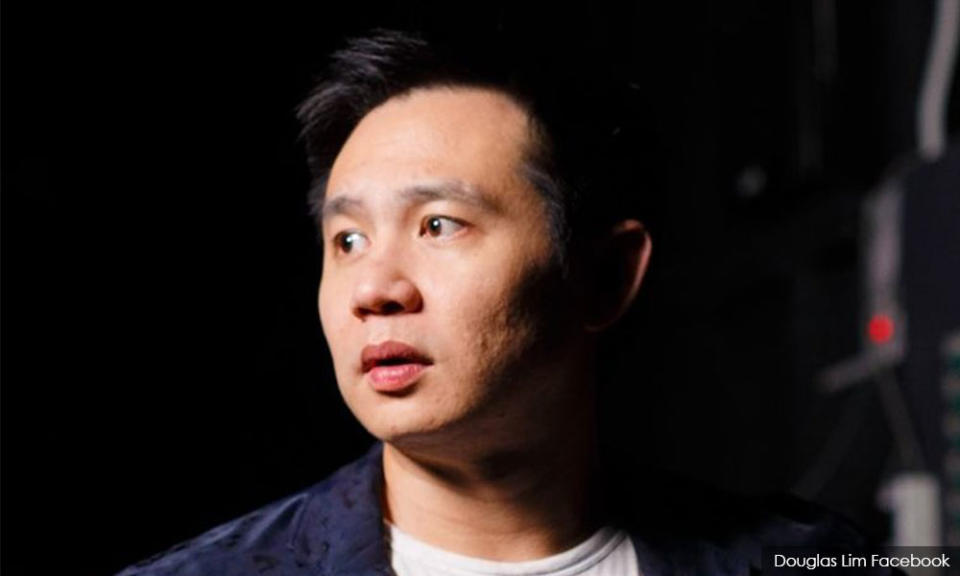
The live music scene is depressing. They try. They play at home and stream it. 12 people watch. This sound is dependent on the device of your listener. So if the device sucks, the concert sucks. It’s really tough.
As far as the future goes, I think there’s definitely going to be a correction, in terms of being oversensitive. Those who are offended on behalf of other people, saying you can't talk about this, you can’t joke about that. I think after a while if this keeps up there’s going to be a correction. It can’t sustain.
The comedy will always have a victim. Even before we have words, what is slapstick? We laugh at a clown falling. We laugh because we know the clown is not hurt. If we see an old person falling on the street, we won’t laugh, we will help them.
So you have these people now saying if you laugh at the clown, then it is going to normalise this behaviour and we will laugh at the old person falling. No way la.
Look at the comedy show Mind Your Language from the 1970s. We look at it now and say OMG you can’t say that. My take on it is that Mind Your Language happened at a time when Pakistanis were getting beaten on the street, there was actual mistreatment of the Chinese and other minorities in the UK. This show came along and took all these oppressive stereotypes and turned them into comedy. This normalises foreign cultures and eventually helped people to become friends.
I won’t say I crack jokes all the time but I am generally pretty obsessed with being funny. Not all the time, but I’m not that serious. I see the funny side most of the time. I think comedians realise how unimportant most things are, and that includes ourselves.
I see new forms of comedy bringing a lot of laughter to people. Andrew Schulz is basically a standup to a camera with graphics in the background. It’s quite exciting and I hope I don’t get too far left behind.
Go back to my music dreams? Probably not. It would just be a vanity project. And I don’t think I will be more fulfilled.
I can’t see myself in politics either. I don’t think I care enough. I point it out. Comedians call it out, we are a mirror to society. But do I have better suggestions?- no I don’t.
My dad knew I wasn’t going to be in the Armed Forces. I am not that brave and also not that obedient. Plus I don’t like flying. He was a civil servant who erred on the side of caution. I think he wanted me to have a job with a monthly salary and EPF.
My degree was actually in English as a second language so I could have been a teacher. I think my parents were a bit worried that they might not have enough of a safety net should I fail.
But luckily I achieved decent success very quickly. My earnings were pretty good until MCO but definitely slashed now.
I used to do a lot of live events for corporate clients but now they have other things to worry about. Still, a lot of marketing people have approached me to make branded contact. It’s something to think about because it’s a lot more work for the same amount of money.
To my fellow Malaysians going through MCO I say - Have fun and hang on! It’s going to be tough but we are not going blind. I’ll see everyone on the other side.
Previously featured:
Jasmine King wants to empower adults against body and sexual shame
He just got started and Parit Coran’s already a world champion speaker
How Elise Arya Chen turned childhood abuse into advocacy for Myanmar refugees
Disabled professor fights to give OKU students chance for success
Dancing a fine line to keep Mak Yong alive
The burning passion behind Time Magazine’s fiery cover
Meet Nicole Fong - an activist researcher hoping to bring people together
Mak Wan's 'dark past' inspires her to serve Chow Kit homeless


